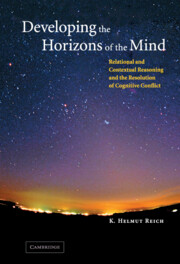 Developing the Horizons of the Mind
Developing the Horizons of the Mind Book contents
- Frontmatter
- Contents
- List of figures
- List of tables
- Acknowledgements
- Introduction
- Part I The Theory of Relational and Contextual Reasoning (RCR) and its Empirical Study
- Part II Applications of RCR
- Overview
- 6 Methodology
- 7 Religion
- 8 The Archaeology of RCR
- 9 Psychology
- 10 Education
- 11 Social Issues
- 12 Conclusions
- Appendix 1 Interviewing techniques
- Appendix 2 Scoring manual for RCR
- References
- Index
11 - Social Issues
Published online by Cambridge University Press: 22 September 2009
- Frontmatter
- Contents
- List of figures
- List of tables
- Acknowledgements
- Introduction
- Part I The Theory of Relational and Contextual Reasoning (RCR) and its Empirical Study
- Part II Applications of RCR
- Overview
- 6 Methodology
- 7 Religion
- 8 The Archaeology of RCR
- 9 Psychology
- 10 Education
- 11 Social Issues
- 12 Conclusions
- Appendix 1 Interviewing techniques
- Appendix 2 Scoring manual for RCR
- References
- Index
Summary
Three issues are discussed in this chapter: (a) overcoming illegal use of drugs; (b) dealing with nuclear energy; (c) rehabilitating depressed areas. The common thread is again what RCR-inspired solutions would look like vs. the actual current state.
Overcoming illegal use of drugs
RCR desiderata
Abuse of drugs, illicit narcotics and other health-impairing substances is unfortunately a real problem in many countries. What can be done about such a state of affairs? On the one hand there are the answers of extremists: (a) make available to every adult what they want, let them be the judge of what is right for them; (b) fight harder, make stricter laws, put more police on the job, punish more heavily, eradicate the evil. Clearly, experience shows that neither (a) nor (b) alone is the solution. In fact, some countries which had moved markedly towards liberalisation have reversed that tendency. Where suppression alone was applied, substance abuse has hardly lessened, if at all.
What would desiderata inspired by RCR look like? The explanandum would be something like, ‘What does it take to maintain physical and mental health of the greatest number of people despite the menace from substance abuse?’
- Type
- Chapter
- Information
- Developing the Horizons of the MindRelational and Contextual Reasoning and the Resolution of Cognitive Conflict, pp. 165 - 184Publisher: Cambridge University PressPrint publication year: 2002


